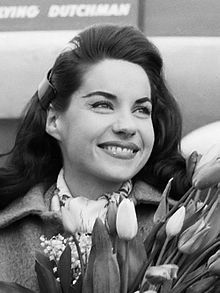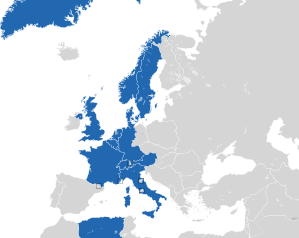
A | B | C | D | E | F | G | H | CH | I | J | K | L | M | N | O | P | Q | R | S | T | U | V | W | X | Y | Z | 0 | 1 | 2 | 3 | 4 | 5 | 6 | 7 | 8 | 9
| Eurovision Song Contest 1960 | |
|---|---|
| Dates | |
| Final | 29 March 1960 |
| Host | |
| Venue | Royal Festival Hall London, United Kingdom |
| Presenter(s) | Catherine Boyle |
| Musical director | Eric Robinson |
| Directed by | Innes Lloyd |
| Executive producer | Harry Carlisle |
| Host broadcaster | British Broadcasting Corporation (BBC) |
| Website | eurovision |
| Participants | |
| Number of entries | 13 |
| Debuting countries | |
| Returning countries | |
| Non-returning countries | None |
| |
| Vote | |
| Voting system | Ten-member juries in each country; each member gave one vote to their favourite song |
| Winning song | "Tom Pillibi" |
The Eurovision Song Contest 1960 was the fifth edition of the annual Eurovision Song Contest, held on Tuesday 29 March 1960 at the Royal Festival Hall in London, United Kingdom, and hosted by British television presenter and actress Catherine Boyle. Organised by the European Broadcasting Union (EBU) and host broadcaster the British Broadcasting Corporation (BBC), the United Kingdom was offered the rights to stage the contest after the Netherlands, which had won the 1959 contest, declined the opportunity after having organised the event in 1958.
Luxembourg returned to the competition after an absence of one year, and Norway made its first contest appearance, bringing the total number of participating countries to thirteen.
The winner was France with the song "Tom Pillibi", performed by Jacqueline Boyer, composed by André Popp and written by Pierre Cour. This marked France's second contest victory, having also won in 1958. The United Kingdom placed second for the second consecutive year and Monaco earned their first top three finish by placing third.
Location

The contest took place in London, United Kingdom. Although the Netherlands had won the 1959 contest in Cannes, the Dutch broadcaster Nederlandse Televisie Stichting (NTS) declined to stage the event for a second time in three years, after hosting the 1958 edition in Hilversum. The rights to staging the contest subsequently passed to the United Kingdom's British Broadcasting Corporation (BBC), following the UK's second place finish in the previous year's event, a decision which was announced in October 1959.[1][2]
The Royal Festival Hall was chosen to stage the 1960 contest. Situated on the South Bank of the River Thames, the venue was first opened in 1951 and was originally conceived for use during that year's Festival of Britain; it is now part of the Southbank Centre, a complex of several artistic venues.[2][3][4]
Participating countries
| Eurovision Song Contest 1960 – Participation summaries by country | |
|---|---|
The number of entries grew to thirteen for this edition, with the eleven competing countries from the 1959 contest being joined by Luxembourg, returning after a one year absence, and Norway, making its first appearance.[1][2][5]
Fud Leclerc made his third appearance at the contest for Belgium, having represented the country in 1956 with "Messieurs les noyés de la Seine" (one of the two Belgian entries in that year's contest) and in 1958 with "Ma petite chatte".[6] The song from Luxembourg was the first contest entry to be performed in Luxembourgish, and one of only three entries to be performed in the language (alongside the country's entries from 1992 and 1993).[7][8]
| Country | Broadcaster | Artist | Song | Language | Songwriter(s) | Conductor |
|---|---|---|---|---|---|---|
| ORF | Harry Winter | "Du hast mich so fasziniert" | German | Robert Stolz | ||
| INR | Fud Leclerc | "Mon amour pour toi" | French |
|
Henri Segers | |
| DR | Katy Bødtger | "Det var en yndig tid" | Danish |
|
Kai Mortensen | |
| RTF | Jacqueline Boyer | "Tom Pillibi" | French | Franck Pourcel | ||
| HR[a] | Wyn Hoop | "Bonne nuit ma chérie" | German |
|
Franz Josef Breuer | |
| RAI | Renato Rascel | "Romantica" | Italian | Cinico Angelini | ||
| CLT | Camillo Felgen | "So laang we's du do bast" | Luxembourgish |
|
Eric Robinson | |
| TMC | François Deguelt | "Ce soir-là" | French |
|
Raymond Lefèvre | |
| NTS | Rudi Carrell | "Wat een geluk" | Dutch |
|
Dolf van der Linden | |
| NRK | Nora Brockstedt | "Voi-voi" | Norwegian | George Elgaaen | Øivind Bergh | |
| SR | Siw Malmkvist | "Alla andra får varann" | Swedish |
|
Thore Ehrling | |
| SRG SSR | Anita Traversi | "Cielo e terra" | Italian | Mario Robbiani | Cédric Dumont | |
| BBC | Bryan Johnson | "Looking High, High, High" | English | John Watson | Eric Robinson |
Format

The contest was organised and broadcast by the BBC, with Harry Carlisle serving as producer, Innes Lloyd as director, Richard Levin as designer, and Eric Robinson as musical director, leading the orchestra during the event.[12][13] Each country was allowed to nominate their own musical director to lead the orchestra during the performance of their country's entry, with the host musical director, Eric Robinson, also conducting for those countries which did not nominate their own conductor.[7]
As had been the case since the 1957 contest, each country, participating through a single EBU member broadcaster, was represented by one song performed by up to two people on stage. The results of the event were determined through jury voting, with each country's jury containing ten individuals who each gave one vote to their favourite song, with no abstentions allowed and with jurors unable to vote for their own country.[1][14] A new innovation for this year's event was to allow the national juries to listen to the final rehearsal of each country, which was also recorded to allow jury members to listen to the entries ahead of the live contest.[2][15]
The draw to determine the order in which each country would perform was conducted on 28 March in the presence of the performers. Performance and technical rehearsals involving the artists and orchestra were held on 28 and 29 March ahead of the live transmission.[2]
Contest overview

The contest was held on 29 March 1960, beginning at 21:00 GMT (21:00 UTC) and lasted 1 hour and 20 minutes.[7][16] The contest was presented by British television presenter and actress Catherine Boyle, the first of four contests in which she participated as host.[7][17] Boyle presided over the opening of the contest and the voting process, while the various national broadcasters that carried the show provided commentary between each act, with the United Kingdom's commentator David Jacobs also being heard by the assembled audience of over 2,500 people in the hall.[2][15]
The winner was France represented by the song "Tom Pillibi", composed by André Popp, written by Pierre Cour and performed by Jacqueline Boyer.[18] Boyer is the daughter of Jacques Pills, who had represented Monaco in the previous year's contest and placed last with "Mon ami Pierrot".[5][7] France's victory was their second in the contest, following their win in 1958, and brought them level on number of victories with the Netherlands.[1][19] The United Kingdom gained their second consecutive second place finish, while Monaco considerably improved upon their debut performance the previous year with a third place finish.[20][21]
It was originally planned for the top three songs to be performed again following the voting, as had occurred in the 1959 contest, however this was ultimately scrapped and only the winning song received its traditional reprise performance.[14] The winning artist was presented with a silver gilt vase, which was awarded by Teddy Scholten; this marked the first time that the previous year's winning artist awarded the prize to the next contest winner, which has since become Eurovision tradition.[5][22]
| R/O | Country | Artist | Song | Points | Place |
|---|---|---|---|---|---|
| 1 | Bryan Johnson | "Looking High, High, High" | 25 | 2 | |
| 2 | Siw Malmkvist | "Alla andra får varann" | 4 | 10 | |
| 3 | Camillo Felgen | "So laang we's du do bast" | 1 | 13 | |
| 4 | Katy Bødtger | "Det var en yndig tid" | 4 | 10 | |
| 5 | Fud Leclerc | "Mon amour pour toi" | 9 | 6 | |
| 6 | Nora Brockstedt | "Voi-voi" | 11 | 4 | |
| 7 | Harry Winter | "Du hast mich so fasziniert" | 6 | 7 | |
| 8 | François Deguelt | "Ce soir-là" | 15 | 3 | |
| 9 | Anita Traversi | "Cielo e terra" | 5 | 8 | |
| 10 | Rudi Carrell | "Wat een geluk" | 2 | 12 | |
| 11 | Wyn Hoop | "Bonne nuit ma chérie" | 11 | 4 | |
| 12 | Renato Rascel | "Romantica" | 5 | 8 | |
| 13 | Jacqueline Boyer | "Tom Pillibi" | 32 | 1 |
Spokespersons
Each country nominated a spokesperson who was responsible for announcing the votes for their respective country via telephone.[24] Known spokespersons at the 1960 contest are listed below.
 Netherlands – Siebe van der Zee[25]
Netherlands – Siebe van der Zee[25] Sweden – Tage Danielsson[15]
Sweden – Tage Danielsson[15] United Kingdom – Nick Burrell-Davis[14]
United Kingdom – Nick Burrell-Davis[14]
Detailed voting results
The announcement of the results from each country was conducted in reverse order to the order in which each country performed.[14]
Total score
|
France
|
Italy
|
Germany
|
Netherlands
|
Switzerland
|
Monaco
|
Austria
|
Norway
|
Belgium
|
Denmark
|
Luxembourg
|
Sweden
|
United Kingdom
| ||
|---|---|---|---|---|---|---|---|---|---|---|---|---|---|---|---|
Contestants
|
United Kingdom | 25 | 2 | 1 | 5 | 4 | 1 | 3 | 2 | 1 | 5 | 1 | |||
| Sweden | 4 | 2 | 1 | 1 | |||||||||||
| Luxembourg | 1 | 1 | |||||||||||||
| Denmark | 4 | 2 | 1 | 1 | |||||||||||
| Belgium | 9 | 3 | 1 | 1 | 4 | ||||||||||
| Norway | 11 | 1 | 1 | 4 | 1 | 1 | 2 | 1 | |||||||
| Austria | 6 | 1 | 1 | 2 | 2 | ||||||||||
| Monaco | 15 | 3 | 7 | 1 | 2 | 1 | 1 | ||||||||
| Switzerland | 5 | 1 | 2 | 1 | 1 | ||||||||||
| Netherlands | 2 | 1 | 1 | ||||||||||||
| Germany | 11 | 4 | 2 | 2 | 2 | 1 | |||||||||
| Italy | 5 | 1 | 2 | 1 | 1 | ||||||||||
| France | 32 | 1 | 2 | 1 | 5 | 1 | 5 | 3 | 4 | 1 | 4 | 5 | |||
Broadcasts
Each participating broadcaster was required to relay the contest via its networks. Non-participating EBU member broadcasters were also able to relay the contest as "passive participants". Broadcasters were able to send commentators to provide coverage of the contest in their own native language and to relay information about the artists and songs to their television viewers.[28]
Known details on the broadcasts in each country, including the specific broadcasting stations and commentators are shown in the tables below.

